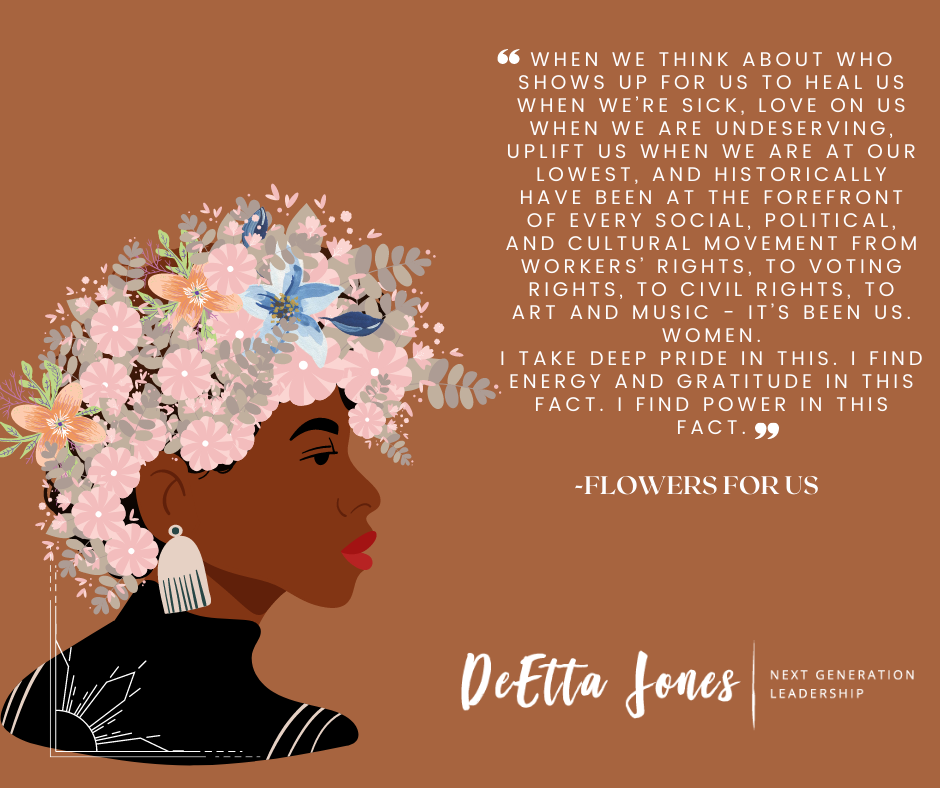
As much as I believe and have even written about pushing away from this sort-of check-the-box approach to EDI work, which generally looks like adding more diverse dates and celebrations to the calendar- I love International Women's Month. This year, the joy and gratitude come with a larger perspective of what Women's History Month means in a more contemporary context.
Women's History Month celebrates the contributions of women in a world that continuously and historically chooses to exclude, undermine, and overlook us. As women, we have endured some of the worst conditions, experiences, and abuses, continuing to march forward with our heads held high. With the weight of generations of women before us, our families, and our futures planted onto the soft grooves of our shoulders, none of the women I know slouch beneath this heavy understanding. I truly admire so many generations of women that stood for what they believed, backs straight and tall ready to face whatever the world had to offer.
When we think about who shows up for us to heal us when we’re sick, love on us when we are undeserving, uplift us when we are at our lowest, and historically have been at the forefront of every social, political, and cultural movement from workers’ rights, to voting rights, to civil rights, to art and music - it’s been us. Women.
I take deep pride in this. I find energy and gratitude in this fact. I find power in this.
The first celebration of the invaluable contributions of women to the fabric of America was Women’s History Day, which was held in New York City on February 28th, 1909. Its roots can also be traced back as early as 1857 when New York City women factory workers staged a protest over poor working conditions. It took 145 deaths from a factory fire a couple of years later for lawmakers to pass legislation to protect the factory workers. Around that time, many of the factory workers were immigrant women as young as 12-years-old.
Many of the women that paved the way for this celebration were just girls.
Women’s History Month as we know it today grew out of a weeklong celebration of women’s contributions to history, culture, and the society organized by the Sonoma Country, California school district in 1978. The district's education task force wanted to draw attention to the fact that women's history wasn't included in the K-12 school curriculum. This countrywide acknowledgment included parades, presentations, essay contests, and educational events and spread nationwide within a few years.
For years women's organizations campaigned to recognize Women's History Week. President Jimmy Carter declared the week of March 8 Women's History Week in 1980. By 1986, 14 states declared the entire month of March Women's History Month, and by March of 1987, congress declared March Women's History Month.
Something powerful to note that relates to today is that the month started as a day, then a week, then a month after tireless fighting from passionate activists. Something even more remarkable is that the month was birthed through protest over working conditions, immigrant groups were a large portion of the population, and there was a countrywide effort (by an all-white country more specifically) to reform the curriculum to an honest, inclusive, and complete account of American history. When you reflect on the headlines that fill our social media feeds, doesn’t this all sound familiar?
Women’s History Month serves as a prime example of why we should teach and include history, the power in recognition instead of excluding out of shame.
Every year has a different theme. According to the National Women's History Alliance, this year's theme is "Women Providing Healing, Promoting Hope.” It is an appropriate theme as it honors all the caregivers, frontline, and essential workers who risked their lives every day during the Covid-19 pandemic. The women doctors, nurses, and healthcare workers that stare this fire breathing dragon in the face every day, risking their mental and physical health, and exhausting their bodies and spirits giving the last of themselves then waking up the next day to do it again to hopefully, possibly keep our society healthy and functioning.
Not only those in healthcare, but this theme also honors the mothers, wives, aunts, sisters, and friends who quit work to take care of children, parents, and grandparents, sacrificed their careers and dreams for their family’s needs, and played impromptu renaissance women taking on the roles of teachers, IT techs, caregivers, therapists, and good friend all while running on nothing but prayers and fumes.
If you want to celebrate Women’s History Month, celebrate through consideration, understanding, and, most importantly, intention.
Learn the history of the women’s struggle and contributions, make yourself aware of current women’s rights issues, take actions that widen your perspectives like reading women authors and listing to podcasts, support local women’s organizations, sports teams, and businesses, and probably the easiest thing we can all do that makes a significant impact - love, support, encourage, recognize, thank, and uplift the women in our lives.
This month we celebrate the contributions of women not only to our history, culture, and society but to our everyday lives in how they show up beautiful, strong, fearless, flawed, vulnerable, and human. Let’s recognize the incredible women throughout history and in our daily lives by honoring them, respecting them, fighting for them, loving on them, and reforming the systems that oppress and limit them.
Let’s give women their flowers - we deserve it. And we prove it every single day.


